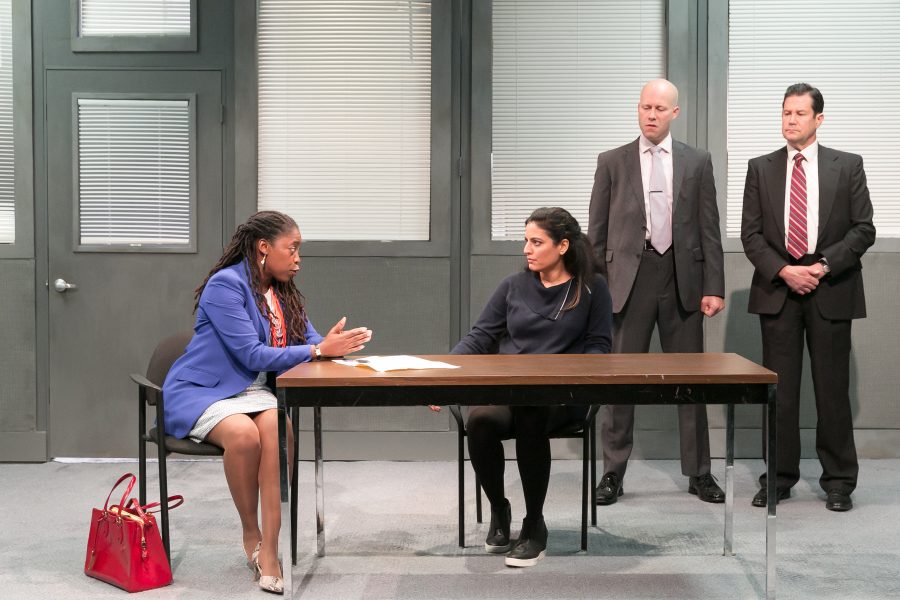Take the bureaucratic horror of the DMV, multiply it by a thousand, and you’ve got “The Hope Hypothesis.”
Amena (Soraya Broukhim), a law student with big aspirations, has been living in the U.S. for 20 years since emigrating from Syria. When she arrives at a local DMV and is asked to present her birth certificate, the ISIS seal on its corner drives the smug teller (Wesley Zurick) into a panic. Written and directed by Cat Miller, this new off-Broadway work explores the absurdities of the U.S. in turns both comical and sickening.
After Zurick pushes the panic button — a comical overreaction that quickly becomes not-so-funny — two FBI agents arrive to interrogate Amena. Never named, and only identified in the playbill as “FBI 1” and “FBI 2,” the two agents are buffoons with a terrifying amount of power. Their incompetency is apparent: they don’t know the law themselves, or how to counter Amena’s clever quips. And yet their authority poses an undeniable threat.
When she asks to call her lawyer, they reference a made-up statute from the “shadow code” that allows them to hold her for 36 hours without representation. If she doesn’t speak for those 36 hours, they can request an extension. For how long? “Indefinitely.”
An eerie, even apocalyptic sense of isolation lingers throughout the play. In the opening scene, for example, Amena walks into the DMV and speaks to the teller, but the rest of the set is empty. There is no one else around, no 17-year-olds waiting to get their licenses, not even any chairs or stanchions set up. Everything is gray: the carpet is gray, the walls are gray, the table is gray. When Amena’s boyfriend Brandon (Charlie O’Rourke) comes looking for her, he too is sucked into the gray abyss, the bureaucratic purgatory that is the world of the play.
Zurick is recognizable as the self-satisfied government worker on a power trip, someone we’ve all encountered at a DMV, and largely provides comic relief with his Dwight Schrute-esque ardor for rules and ordinances. But his obedience is also dangerous, and Miller is careful not to overlook this. His sudden displays of callousness, such as when he tells his supervisor in an offhand comment that Amena will probably just be deported back to where she came from and they will move on with their lives, bring the play’s action to a halt and demand our contemplation.
It is the teller’s supervisor (Connor Carew), a lovable, albeit clueless, teddy bear, who articulates the titular hypothesis. When people lose hope, he says, they either destroy themselves or everything around them. And when people are afraid, story — a clear, easily digestible narrative — becomes more compelling than evidence. It is an astute observation from an unlikely messenger that distills the play’s central concerns.
Some moments do miss the mark. When O’Rourke sticks his head in the break room oven a la Sylvia Plath, the gesture seems to be played for laughs — O’Rourke’s cries are campy and overplayed — and yet Zurick and Carew seem to be in a different play, reacting earnestly. It is not so much the potential insensitivity of such a gag to the reality of suicide as it is as the play’s own uncertainty of its tone that makes this moment uncomfortable. While Miller is generally adept at shifting between lightheartedness and solemnity, between hilarity and horror, her depiction of Brendan’s suicide attempt is unsuccessful as it oddly intermingles these two modes instead of peeling back the humor to reveal, in a sudden flash, the insidiousness lurking beneath it.
One also wonders what Amena’s model citizen status means for other, less accomplished and exemplary immigrants. Would the story be as empathetic to Amena if she was not so bright and shiny, if her record were not as spotless? She did cheat on her boyfriend; this seems to be the play’s attempt at letting us know she is flawed. But her virtuousness remains a pillar on which the “The Hope Hypothesis’s” moral conviction rests until the play’s final bows.
The play’s final scene is arresting, ending the show on a hair-raisingly circular note, with the suggestion that this bureaucratic purgatory has become a bureaucratic hell.
“The Hope Hypothesis” is playing at The Sheen Center for Thought and Culture, 18 Bleecker St., through Nov. 15.
Email Julie Goldberg at [email protected].


























































































































































